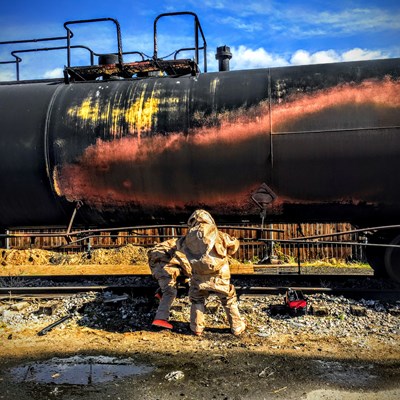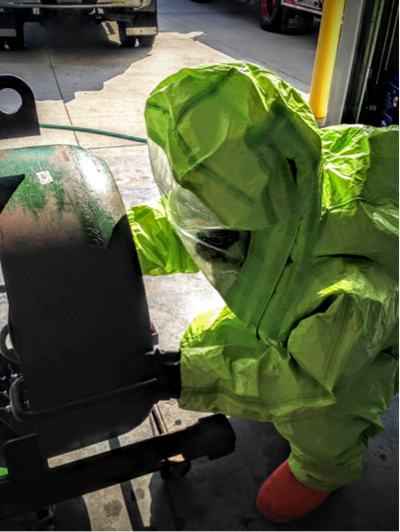
HazMat Technician
Pro Board® Accredited / 80 hours
The HazMat Technician course is designed specifically for fire and rescue personnel who may respond to incidents involving hazardous materials (hazmats) and/or weapons of mass destruction (WMDs).
This course is a 10-day (80 hour), participant-centered, instructor-led training program for first responders.
Upon completion of the course, participants will be able to perform the following at hazardous materials/WMD incidents using the IAFF’s risk-based response process – APIE:
- Analyze the incident to determine the complexity of the problem and potential outcomes.
- Plan a response including developing response objectives, identifying potential response options, selecting the personal protective equipment (PPE) required and a technical decontamination process, and developing an IAP.
- Implement the planned response consistent with local emergency response plans and/or standard operating procedures by performing the duties of the hazmat branch; donning, doffing, and working in PPE; and performing control functions and decontamination.
- Evaluate the progress to determine the effectiveness of control and decontamination functions identified in the IAP.
Prerequisites
This training course is designed for students who have already completed Operations level HazMat response training.
Codes and Regulations Met
The course goal is to educate emergency responders about strategies to safeguard health and safety when their work involves offensive operations at hazardous materials/weapons of mass destruction (WMDs) in accordance with:
- OSHA 29 CFR 1910.120, Hazardous Waste Operations and Emergency Response
- NFPA 470: Hazardous Materials/Weapons of Mass Destruction (WMD) Standard for Responders, 2022 Edition, Chapter 11
- NFPA® 1991: Standard on Vapor-Protective Ensembles for Hazardous Materials Emergencies
- NFPA® 1992: Standard on Liquid Splash-Protective Ensembles and Clothing for Hazardous Materials Emergencies
- NFPA® 1994: Standard on Protective Ensembles for First Responders to Hazardous Materials and CBRN Terrorism Incidents

Participants must demonstrate mastery of the course objectives by completing the certification (post) test, and a randomly selected scenario-based practical exercise. The certification test includes 100 knowledge-based items. Evaluation scenarios have been developed to ensure participants are evaluated in a high-fidelity, simulated environment.
Scenarios require participants to apply the APIE and includes mandatory completion of analysis, detection and monitoring, response planning, PPE and decontamination selection and use, and product control. Participants, who pass both the written (70%) and skills evaluations, are certified through the National Board on Fire Service Professional Qualifications (the Pro Board®) at the HazMat Technician level.
Certification
Once a participant completes the course, including the performance (skills) evaluation, and scores above 70%, they will receive an IAFF certificate with a Pro Board® seal. The IAFF will then submit the participant’s name to the National Board on Fire Service Professional Qualifications (Pro Board® registry). Pro Board® certification holds:
- Recognition for demonstrating proficiency
- A permanent record of the accomplishment
- Transferability/portability of qualifications, as reciprocity means Pro Board® certification will be recognized by fire departments nationwide.
Additional Accreditation
Fire fighters and personnel who have successfully obtained Pro Board® certification may be eligible to transfer in college credits toward the following Kaplan University degree programs: Associate of Applied Science (AAS) in Fire Science, Bachelor of Science (BS) in Fire Science, Bachelor of Science in Fire and Emergency Management. Completing the HazMat Technician program allows participants a total of five credits of a fire science elective at Kaplan University.
Recommended
OSHA physical examination in accordance with 29 CFR §1910.120 and 29 CFR §1910.134.